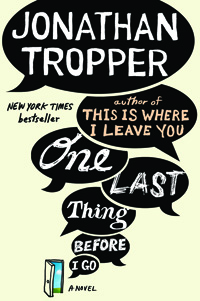For thirteen years, Jonathan Tropper has been writing bestsellers that address a fundamental question: when life doesn’t turn out as you planned, what do you do next? His titles reflect this concern with painful transitions: Plan B, Everything Changes, How to Talk to a Widower, This Is Where I Leave You, and One Last Thing Before I Go. The protagonists of his novels, typically men on the cusp of middle-age, confront divorce, infidelity, career change, and—surprisingly often—death. But Tropper’s novels are not downers; indeed, they are fun: big, knee-slapping, tear-inducing comedies that inspire readers to read choice passages out loud. Though they confront life’s most devastating events, Tropper’s books also provide a guide for surviving the calamity and discovering what lies on the other side.
 In One Last Thing Before I Go, newly released in paperback, Drew Silver’s best days are unquestionably in the past. A drummer whose rock band, the Bent Daisies, experienced a single summer of stardom before breaking up, Silver now spends his days in a lonely-hearts bachelor pad and his evenings banging the skins at weddings and bar mitzvahs, occasionally summoning the energy for one-night stands with bridesmaids. Then his mostly estranged teenage daughter asks him to help her through an unplanned pregnancy, and, days later, Silver collapses from a tear in his aorta. He needs emergency surgery—at the hands of his ex-wife’s fiancé, a cardiologist—or risk sudden death. What happens next propels this hilarious and moving novel.
In One Last Thing Before I Go, newly released in paperback, Drew Silver’s best days are unquestionably in the past. A drummer whose rock band, the Bent Daisies, experienced a single summer of stardom before breaking up, Silver now spends his days in a lonely-hearts bachelor pad and his evenings banging the skins at weddings and bar mitzvahs, occasionally summoning the energy for one-night stands with bridesmaids. Then his mostly estranged teenage daughter asks him to help her through an unplanned pregnancy, and, days later, Silver collapses from a tear in his aorta. He needs emergency surgery—at the hands of his ex-wife’s fiancé, a cardiologist—or risk sudden death. What happens next propels this hilarious and moving novel.
Prior to his appearance at the Southern Festival of Books, Tropper answered questions from Chapter 16 by email:
Chapter 16: Filming has wrapped on This Is Where I Leave You. What can you tell us about your experiences as screenwriter on that project, and when can we see the film?
Jonathan Tropper: Adapting your own work can be tricky, but it’s better than watching someone else do it. The shoot itself was incredible. Watching these actors bring my book to life was both highly surreal and extremely rewarding. Right now I believe the release date is in the fall of 2014, but that could change at any time.
Chapter 16: Why are the vexed relationships between fathers and children such fertile literary ground for you?
Tropper: The familial relationships of our childhood are the formative ones. They become like secondary DNA, encoding our psychology for everything that follows. So examining them is a dynamic and dramatic way of psychoanalyzing your characters.
Chapter 16: One way to enliven a dinner party is to take down any of your novels (particularly The Book of Joe and This Is Where I Leave You) and read out loud the raunchy beginnings. What are your goals for opening chapters?
Tropper: Well, I don’t think of them as raunchy, but I am a firm believer in starting your stories already in motion. I don’t like to start with any exposition. As a reader, I like to be brought right into the action and fill in the information as I read on, so that’s how I approach it as a writer.
Chapter 16: Your last two novels are open-ended: readers don’t learn the protagonists’ fates (though happy endings seem imminent). What’s the advantage of an ambiguous ending?
Tropper: I don’t mean for the endings to be emotionally ambiguous. In both cases, the character has completed his journey. To then resolve the plot and tie it up with a bow might have been satisfying for some, but to me it would have pulled focus from the emotional arc of the characters.
 Chapter 16: Your novels tend to have large casts of characters, all of whom are distinctive and memorable from the moment they appear. How do you go about creating characters?
Chapter 16: Your novels tend to have large casts of characters, all of whom are distinctive and memorable from the moment they appear. How do you go about creating characters?
Tropper: My general rule is, everyone must be humanized. I create each character as if they are going to be at the center of their own novel, even if we just meet them for a chapter.
Chapter 16: For years you taught fiction writing to college students. How did your work in the classroom affect your own work?
Tropper: It was a great experience, and if I had the time I would still be doing it. Working with writers who are just discovering their voices, teaching them how to critique their own work, gives me a sharper perspective on my own work.
Chapter 16: Most of your novels are haunted by the specter of death, one that has just occurred or one on the horizon, and yet your novels are comedies, in both senses: they are funny, and they end happily. What’s the secret to intermingling tragedy and comedy successfully?
Tropper: I don’t know the secret. None of it is intentional. I want to write about the larger emotional moments in our lives—love, family, death, heartbreak—and while that stuff comes with its own built-in gravity, it can also be funny as hell, because, in general, human beings are funny people.
Jonathan Tropper will appear at the twenty-fifth annual Southern Festival of Books, held in Nashville October 11-13, 2013. All festival events are free and open to the public.
Tagged: Fiction





